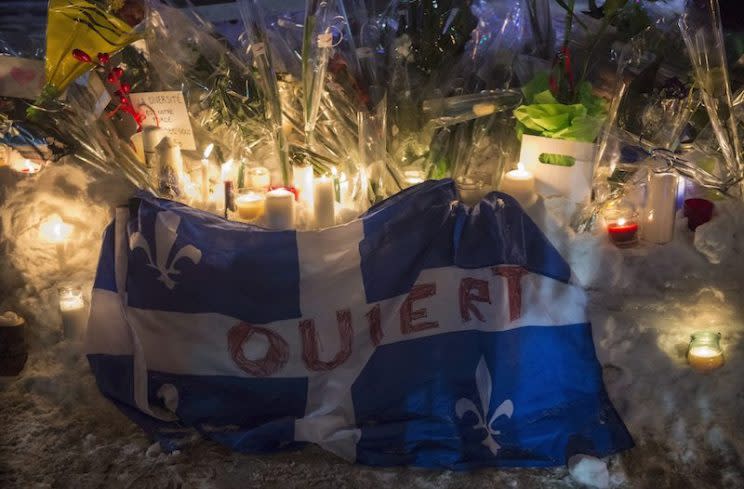'This didn’t start yesterday': Quebec's history with Islamophobia and the problem nationwide

The deadly shooting at a Quebec City mosque is highlighting concerns about rising Islamophobia in the province, after years of polls showing growing anti-Muslim sentiment and proposed laws targeting religious garb.
“Muslims are fearful, they are concerned. Over the last ten years or so we’ve seen the rise of Islamophobia,” imam Yūsuf Badāt of the Islamic Foundation of Toronto told Yahoo Canada News.
The Islamophobia seen in Quebec is part of a broader history discrimination in Canada, says Michelle Hartman, an Islamic studies professor at McGill University.
“There is a specific local context to Quebec, and we have a lot of things here that foster and give rise to racism and Islamophobia … But they’re also not specific,” Hartman said.
Read more:
Canadians need to talk about racism and Islamophobia, legal advocacy groups say
Former GG draws line linking ‘ugliness’ in U.S. to Quebec City mosque attack
Alleged shooter in Quebec City mosque attack admires Trump, far right
For example, the racism and exclusion of Muslims is akin to police carding of Black and brown people in Toronto or the residential school system for Indigenous people, she says.
Recent history with Quebec and Islam
Thousands protested in Quebec in 2013 against a proposed charter of values that would have forbidden public employees from wearing conspicuous religious symbols like hijabs, turbans, yarmulkes, or larger-than-normal crucifixes.
And Bill 62, introduced in Quebec last year and currently in committee, would prohibit anyone receiving public services or working in the public sector to wear a face covering like a niqab. The Canadian Civil Liberties Association has called Bill 62 “a deeply troubling law that would infringe basic rights and cannot be justified in a free and democratic society.”
Similar laws in Europe have been tied to a rise in anti-Muslim sentiment and even personal attacks. When France introduced a ban on veils covering the face, some say incidents of Islamophobia rose, in particular those targeting women. And when some French communities banned burkinis, videos of Muslim women being publicly singled out for discrimination cropped up online.
The problem goes beyond government policy. A survey done by the Quebec Human Rights Commission in 2015 found that 48.9 per cent of respondents were bothered by “being attended to” by a woman in a hijab. According to data from the Minister of Public Security in Quebec the number of annual hate crimes in the province was 257 in 2014-15, compared to 198 in 2010-11.
The often-changing nature of hate groups makes them difficult to track but a study released last February found that there were dozens across the country at any one time, with most located in the populous provinces of Ontario and Quebec.
Moving forward
Days after the attacks in Quebec City, there is fear and apprehension among Muslims in Canada, Badāt says. And Montreal police reported Tuesday that there has been a spike in hate crime calls since Sunday’s shooting.
Just as some legislators have played a role in stoking Islamophobia with their words, they can have a part in countering it, Badāt says.
“In terms of government I think it’s high time that they need to establish some legislation around Islamophobia, because it’s real,” he said. M-103, a motion calling on the government to look into reducing Islamophobia and other systemic discrimination is scheduled for debate in the House of Commons in February.
But Badāt says he and other Muslim leaders are also heartened by the support he has seen from Canadians since the Quebec City attack. Coming together combats the ignorance that fosters hate, he says.
“This is an opportunity to collaborate and work together and make efforts to understand each other,” Badāt said.
Part of that work is looking not just at Quebec and Islamophobia itself, Hartman says, but at discrimination across the country. She says rhetoric about an open and inclusive society needs to be reflected in government policy — such as the rules for refugee admission or in our immigration system.
“This didn’t start yesterday, or even 2012 or 2007. It’s a much longer and deeper problem,” Hartman said.



